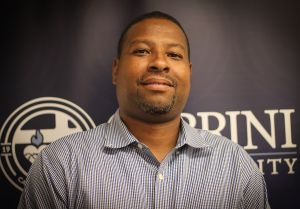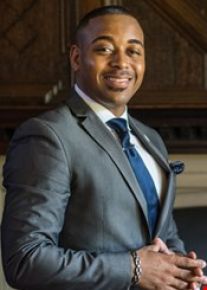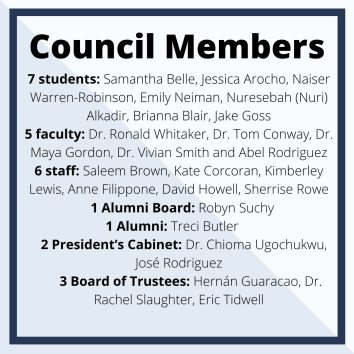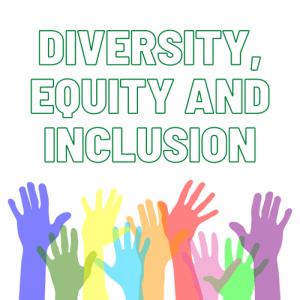A new advisory council entitled “Diversity, Equity and Inclusivity,” or DEI Advisory Council, has started at the University. The co-chairs of this new council are Eric Tidwell and Dr. Ronald Whitaker.
About the Co-Chairs

Photo by Cabrini University
Tidwell is an alumnus, class of 1996, a member of the Cabrini Alumni Board, part of the Cabrini Athletic hall of fame and member of the Board of Trustees. As a member of the Board of Trustees, Tidwell is able to see things at different levels and different perspectives. Ultimately, the students are his passion. Going to most, if not all of the events Cabrini holds, he enjoys talking to the students and understanding, from their standpoint, what is going on and how things are run on a day-to-day basis.
“My passion came from understanding that these issues are happening and knowing that these issues are happening at Cabrini,” Tidwell said. “It was time to be involved, not so much as from a trustee member, but time to get my hands involved and be personally invested in to address these issues.”

Photo by Cabrini University
Whitaker was recruited six year ago to grapple with issues relating to diversity, equity and inclusion as well as culturally responsible pedagogy in the school of education during that time. The courses that Whitaker teaches at the university as well as the articles such as journals, book chapters and op-eds that he writes all grapple with the such issues including issues around race and racism. Additionally, he went deeper in his training and knowledge by completing a graduate certificate at Cornell University in diversity and inclusion.
“Once this council came about, Eric reached out to me about how we want to introduce some deep-rooted initiatives that will lead to long term change,” Whitaker said. “That way, in 10 years from now, we have an inclusivity infrastructure in place that really values all of our stakeholders and, primarily in this context, our students.”
Background
One of the main responsibilities of the Board of Trustees is to uphold Cabrini’s mission statement, upholding social justice. The Board of Trustees must make sure Cabrini abides by the mission when looking at different types of issues on campus (past and present) and currently in society.
“The board knew it was time,” Tidwell said. “The board said that we need to be able to give more focus to this, more focus than it would get in the past. It was time for the Board of Trustees to be accountable and this gave them the ability to work with everyone at the university. From staff to students, to have everyone work together to address these issues.”
Originally named the DEI Taskforce, it was changed to an advisory council.
“We decided not to go with the task force name,” Tidwell said. “The DEI task force mainly means short term and deals with a single issue and the issues we are dealing with are not short term.”
Who is involved
There are currently 25 members within the DEI advisory council, and all are welcome. There are two key aspects when starting this advisory council. First, it has to be a diverse group. The advisory council is not a top-down approach meaning there is no set structure within the board and no hierarchy.
“We want to make sure that we had diversity in terms of representation on the council that they can share from their unique vantage point,” Whitaker said. “We want to make sure we had representation from a staff perspective, those key areas such as the admissions, athletics and residents. We needed to make sure that everyone was a part of this because no one is an expert in terms of DEI for the entire campus because we are all looking at it from different perspectives.”
The second and most biggest aspect of starting this advisory council are the students. The students have to be involved through student voice.
“The students are so key to this,” Tidwell said. “We got to see things through their lens. The students are the main drivers behind this.”

Goals
According to their mission statement, the council’s goal is to make Cabrini a more welcoming campus for all, especially BIPOC students, Latinx students, LGBTQIA+ students, first generation students and international students.
Their mission statement explains that the council “seeks to provide recommendations, goals, outcome indicators, and accountability measures to the Cabrini University senior leadership team with the hopes of advocating for true equity for students and a robust inclusivity infrastructure, in which everyone feels a sense of belonging at Cabrini University.”
Their main goals are to address current practices and provide equal access to all students on campus, especially those who were excluded or marginalized or belonging to minority groups in the past. They want to give all students a sense of belonging. They plan to proactively educate everyone on campus to prevent racial insensitivity and discrimination and will identify current and past issues and develop responsive strategies. They aspire to create processes whereby confirmed or suspected cases of discrimination will be reported, investigated and addressed.
Both Tidwell and Whitaker agree that transparency, accountability and sustainability are crucial to this operation and in implementing their goals.
“Everyone has to be accountable,” Tidwell said. “The expectation is how we make it the best experience for the students and that’s what we are here for. We need to make this happen.”
He went on to explain that he wants everyone, including alumni, to feel proud of our institution.

“The community is holding us accountable, it is not some sort of acute plan that lives in the mansion that no one has access to…,” Whittaker said.
Tidwell explained that their implementation strategy will be sustainable and measurable and that they will share the steps they take.
Both Tidwell and Whitaker explained that they felt “a sense of responsibility” and expect this council to be a voice on campus that creates change in the community and academics. They explained that this is not just an issue at Cabrini, as these issues are deeply rooted in the current system in the United States and that they intersect into organizations.
“This is not a once a semester thing,” Tidwell said.
“…No longer can we accept these results that have been happening for generations,” Whitaker added.
“We can’t fail,” Tidwell said.
Hitting Close to Home
Tidwell received a text message from a Cabrini alumus when he found out about the black@cabrini Instagram page that was created over the summer. The page’s posts describe incidents of racism and discrimination experienced by Cabrini students and faculty, past and present. Tidwell’s immediate reaction was anger, not at the posts themselves, but as a member of a community responsible for fighting injustices to seek a better environment for all. His anger quickly transpired into frustration for those who came forward with experiences of discrimination and intolerance.
“It really hit home,” Tidwell said. “It hit here [pointed to his heart]. Being a Black person, a Black man, being a Cabrini alum, knowing that what more could I have done to help any of those students, alumni, current students…who had incidents, to prevent those?”
Whitaker had mixed emotions about the page and expressed that faculty and staff at Cabrini underscore exactly what students go through on campus.
“It shouldn’t have been surprising, because unfortunately, whether we’re talking about faculty and staff of color, or faculty and staff that are part of the LGBTQI community, many of them have shared the same things in conversation,” Whitaker said.
Whitaker warned that if Cabrini continues to ignore these incidents, the social justice aspect of its mission will become “watered down.” He compared it to the “soup of the day” – everyone talks about it like it is special, but we do not view social justice as the main portion at our institution. When talking about the role of faith in the DEI Advisory Council, Whitaker spoke of the prophets in the Old Testament who warned that if the community did not repent for its sins, there would be destruction from within. This council intends to hold campus accountable, to right its wrongs and to change in solidarity with one another.
The DEI Advisory Council is aiming for a “holistic approach” to curriculum changes. Average history classes that include Black studies, Latinx studies and LGBTQI studies on a regular basis. The council has different working groups that are addressing specific topics across campus like integrating these studies into the core curriculum.
A significant motivation behind the creation of the DEI Advisory Council stems from the most important role both men play in their own lives.
Tidwell described his young daughter’s reaction to the Breonna Taylor verdict in Louisville, Kentucky. He was amazed how his little daughter knew right from wrong like it was just common sense. He believes most of the answers to Cabrini’s problems lie with the young students too.
“As a father, I realize how smart children are and how they see things the right way, and I feel students, at least the students I’ve interfaced with at Cabrini, have the same mindset.”


